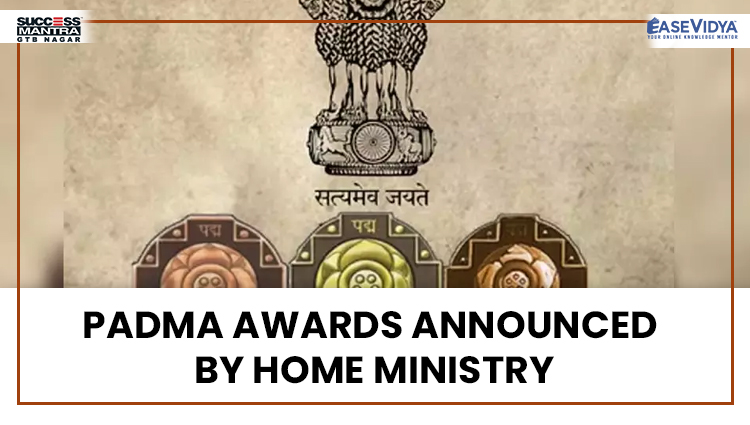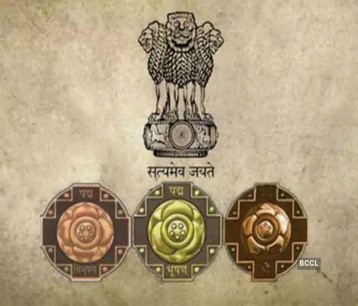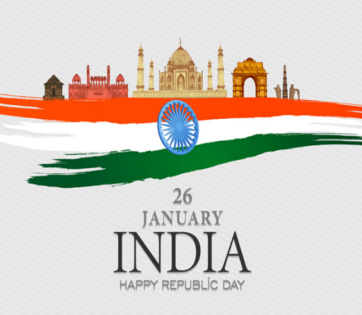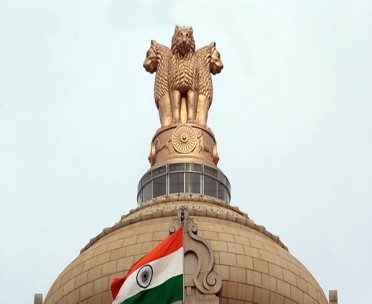
PADMA AWARDS ANNOUNCED BY HOME MINISTRY
PADMA AWARDS ANNOUNCED BY HOME MINISTRY
The Home Ministry announced the list of recipients of the Padma Awards which is one of the highest civilian awards of India. Padma Awards 2022 has been conferred upon a total of 128 people in three categories- Padma Vibhushan, Padma Bhushan, and Padma Shri. The three Padma Awards are later conferred by the President of India at a ceremonial function that will be held at Rashtrapati Bhawan around March or April every year.
Some of the eminent names announced for Padma Awards 2022 are India’s first Chief of Defence Staff Bipin Rawat who died in December 2021 in a horrific chopper crash. He has been honoured posthumously with Padma Vibhushan. Olympic Gold Medalist Neeraj Chopra and Singer Sonu Nigam have been awarded Padma Shri while the heads of Microsoft and Google Satya Nadella and Sundar Pichai have been named for Padma Bhushan. The full list of Padma Awards 2022 recipients comprises 17 Padma Bhushan, 4 Padma Vibhushan, and 107 Padma Shri Awards.
Padma Awards 2022: Padma Vibhushan
- Prabha Atre ---- Art ---- Maharashtra
- Radheyshyam Khemka (Posthumous) ---- Literature & Education ---- Uttar Pradesh
- General Bipin Rawat (Posthumous) ---- Civil Service ---- Uttarakhand
- Shri Kalyan Singh (Posthumous) ----- Public Affairs ---- Uttar Pradesh
Background: The Padma Awards are announced annually on the Republic Day (26th January). Instituted in 1954, it is one of the highest civilian honours of India.
Objective: The Award seeks to recognize achievements in all fields of activities or disciplines where an element of public service is involved.
Categories: The Awards are given in three categories:
- Padma Vibhushan (for exceptional and distinguished service),
- Padma Bhushan (distinguished service of higher-order) and
- Padma Shri (distinguished service).
Padma Vibhushan is highest in the hierarchy of Padma Awards followed by Padma Bhushan and Padma Shri.
Disciplines: The Awards are given in various disciplines/ fields of activities, viz.- art, social work, public affairs, science and engineering, trade and industry, medicine, literature and education, sports, civil service etc.
Current Affairs Notes By Success Mantra Coaching Institute GTB Nagar Delhi CLICK HERE
Bharat Ratna
Bharat Ratna is the highest civilian award of the country. It is awarded in recognition of exceptional service/performance of the highest order in any field of human endeavour. It is treated on a different footing from Padma Award. The recommendations for Bharat Ratna are made by the Prime Minister to the President of India. The number of Bharat Ratna Awards is restricted to a maximum of three in a particular year.

73RD REPUBLIC DAY CELEBRATED ON 26TH JANUARY
Republic Day (73rd) is celebrated every year on 26th January to commemorate the adoption of the Indian Constitution, which came into effect on this day in 1950. The Constitution is the supreme law of the land and citizens are expected to abide by it.
Background: India became an independent nation on 15th August, 1947 — a date thrust upon by Lord Louis Mountbatten, as it marked the second anniversary of Japan’s submission to allied powers after World War II. After India became independent, it did not have its own constitution. The laws were based on a common law system and a modified version of the “Government of India Act, 1935”, which was brought in by the British government. Approximately two weeks later, a Drafting Committee was appointed to draft the Indian Constitution with Dr BR Ambedkar as the chairman. The Indian Constitution was finally ready and adopted on 26th November, 1949 (Constitution Day). The Constitution came into effect after two months, on 26th January, 1950. The Indian National Congress, on 19th December, 1929, passed a historic resolution of “Purna Swaraj” or complete self-rule at its Lahore session. It was declared by the Congress party that 26th January, 1930, will be celebrated as “Independence Day” by the Indians. Pandit Jawaharlal Nehru, who was the President of Congress party, hoisted the tricolor on the banks of the Ravi river in Lahore. This day was celebrated as Poorna Swaraj day for the next 17 years. Thus, when the Constitution of India was adopted on 26th November, 1949, many considered it necessary to celebrate and enforce the document on a day associated with national pride, which was

SIGNIFICANCE OF REPUBLIC DAY
Republic day is a monumental day in Indian history because it was on this day that India adopted its own Constitution and declared its own laws of the land. The British colonial Government of India Act (1935) was finally replaced and the country was set to make a fresh start. Additionally, it was also on this day that the Preamble of the Constitution of India came into effect. The Preamble is largely a comprehensive statement that presents the key principles of the Constitution. On this day India shed the last relic of the colonial system and effected a new dawn by becoming a Sovereign Democratic Republic. The day is an occasion to commemorate the values of our democracy and Republic, to reaffirm our commitment to liberty, fraternity and equality across our society and among all our citizens. The day celebrates the desire of a huge nation that wants to be governed through one single constitution giving another example of India’s unity in diversity.

PRAVAHINI Current Affairs Notes By Success Mantra Coaching Institute GTB Nagar Delhi CLICK HERE
SOVEREIGN, DEMOCRATIC & REPUBLIC
- Sovereign: The word ‘sovereign’ implies that India is neither a dependency nor a dominion of any other nation, but an independent state. There is no authority above it, and it is free to conduct its own affairs.
- Democratic: It is based on the doctrine of popular sovereignty, that is, possession of supreme power by the people.
- Republic: Preamble indicates that India has an elected head called the President. He is elected indirectly for a fixed period of five years.
CONCLUSION
Our Republic has come a long way and we must appreciate how far successive generations have brought us. Equally, we must appreciate that our voyage is far from complete. There is a need to recalibrate our yardstick of achievement and success - from quantity to quality; from a literate society to a knowledge society in order. No conception of India's development can be complete without a salute to our spirit of inclusiveness. India's pluralism is its greatest strength and its greatest example to the world. The "Indian model" rests on a tripod of diversity, democracy and development where we cannot choose one above the other. The nation needs to encompass all segments and all communities, so that the nation transforms into a family that invokes, encourages and celebrates the uniqueness and potential in each person.
TEST YOURSELF
Q.1 On the eve of Republic Day 2022, 4 eminent personalities have been honoured with Padma Vibhushan. Which of the following is not one of them?
- General Bipin Rawat
- Shri Kalyan Singh
- Neeraj Chopra: ANSWER
- None of the following
Q.2 From the given options, which of the following is the highest civilian honour/award of the nation?
- Padma Vibhushan
- Bharat Ratna: ANSWER
- Padma Shri
- None of the above
Q.3 In which of the following disciplines/categories Padma Awards are presented to the awardees on the eve of Republic Day?
- Public Affairs
- Science and Engineering
- Literature and Education
- All of the following: ANSWER
Q.4 Which of the following world leaders have been invited at the Republic day 2022, which was later cancelled due to the immediate surge in COVID-19 cases?
- Leaders of Central Asian Nations: ANSWER
- Leaders of ASEAN countries
- President of Brazil
- None of the following
Q.5 The Indian National Congress, on 19th December, 1929, passed a historic resolution of “Purna Swaraj” or complete self-rule at its _________?
- Calcutta session
- Bombay Session
- Madras Session
- Lahore Session: ANSWER












0 Comment